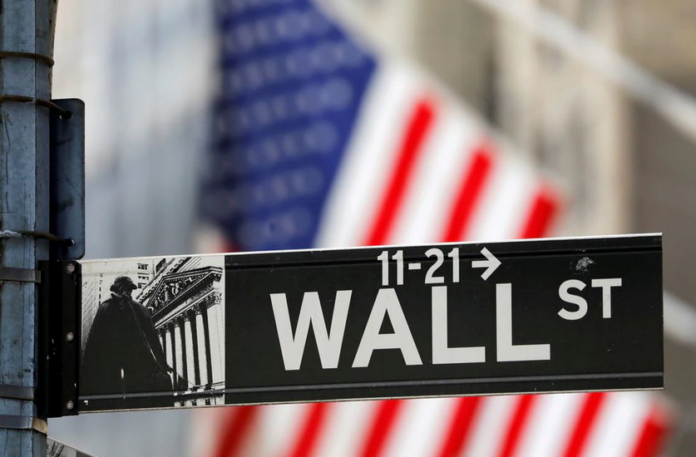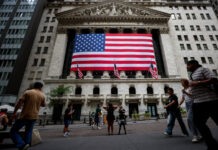
US stocks wavered and Treasuries slumped as traders recalibrate their expectations in response to the Federal Reserve indicating that it will continue to raise interest rates to tamp down on inflation.
The S&P 500 fluctuated after dropping as much as 1% on Monday. The Nasdaq 100 trimmed declines after falling much as 1.3%. US Treasury yields rose, with the 10-year rate hovering around 3.12%. The two-year yield had climbed to its highest level since 2007 before paring the advance.
Fed Chair Jerome Powell’s speech during the Jackson Hole symposium had made it clear that a dovish pivot that some investors had been positioning for was unlikely. He had also warned of the potential for economic pain for households and businesses as the central bank continues to be aggressive to battle inflation.
“The process of a Fed funds hike cycle, especially in the early days of such a cycle, is never easily digestible for the markets,” wrote John Stoltzfus, chief investment strategist at Oppenheimer. “This process often comes with periods of elevated anxiety and volatility for market participants.”
The current rate-hike cycle to “particularly rough to manage” as it involves policy tightening combined with sky-high inflation, which the Fed has still not been able to slow meaningfully, he said.
August and September also tend to be the worst months for the S&P 500 Index, with the index averaging declines of 0.6% and 0.7%, respectively, over the past 25 years.
“Since WWII, the S&P 500 posted the worst average monthly price change in September, joining February as the only two months to register declines,” Sam Stovall, chief investment strategist at CFRA wrote in a note. “Yet, September stands alone as the only month in which the market fell more frequently than it rose. What’s more, the best September return places it in the bottom quarter of all months, while its deepest one-month decline was among the four worst.”
But going forward, weaker earnings — not higher interest rates — could pose the largest threat to US stock prices, Morgan Stanley strategists led by Michael J. Wilson said in a research note Monday. The bank’s leading earnings model, which projects a steep fall in earnings per share growth over the next several months, confirms that view.
“The path for stocks from here will be determined by earnings, where we still see material downside,” the strategists said. “As a result, equity investors should be laser focused on this risk, not the Fed.”
Seema Shah, chief global strategist at Principal Global Investors, echoed the sentiment.
“While earnings season has been positive, persistent challenges indicate an increasingly difficult operating environment, likely limiting profit persistence in the second half of the year,” she wrote.
Bonds in Europe tumbled, with Germany’s 10-year yield rising as high as 1.5% after a string of European Central Bank officials over the weekend stressed the need to act more forcefully to quash record inflation.
ECB officials read from a similar script as Powell. Austria’s Robert Holzmann and Dutch colleague Klaas Knot both floated the prospect of an unprecedented three-quarter point hike at their meeting in September. Executive Board member Isabel Schnabel warned that the likelihood of inflation expectations becoming unanchored is uncomfortably high.
Bitcoin pushed above the $20,000 level that some view as a marker of a deeper slide in investor sentiment. Oil made gains on supply risks.
Here are some key events to watch this week:
- US consumer confidence, Tuesday
- New York Fed President John Williams due to speak, Tuesday
- ECB Governing Council members due to speak at event Tuesday through Sept. 2
- China PMI, Wednesday
- Euro-area CPI, Wednesday
- Russia’s Gazprom set to halt Nord Stream pipeline gas flows for three days of maintenance, Wednesday
- Cleveland Fed President Loretta Mester due to speak, Wednesday
- China Caixin manufacturing PMI, Thursday
- US nonfarm payrolls, Friday
- UK leadership ballot closes Friday. Winner announced Sept. 5
Some of the main moves in markets:
Stocks
- The S&P 500 was little changed as of 12:52 p.m. New York time
- The Nasdaq 100 fell 0.3%
- The Dow Jones Industrial Average was little changed
- The MSCI World index fell 2.3%
Currencies
- The Bloomberg Dollar Spot Index was little changed
- The euro rose 0.5% to $1.0014
- The British pound fell 0.2% to $1.1721
- The Japanese yen fell 0.8% to 138.72 per dollar
Bonds
- The yield on 10-year Treasuries advanced eight basis points to 3.12%
- Germany’s 10-year yield advanced 11 basis points to 1.50%
Commodities
- West Texas Intermediate crude rose 3.4% to $96.19 a barrel
- Gold futures were little changed

















